- Home
- Neal Asher
The Skinner s-1 Page 7
The Skinner s-1 Read online
Page 7
Windcheater’s mouth was hanging open now and his bifurcated tongue was licking across his many teeth. One talon was rising up off the stone as if he wanted to grab the aug right now.
‘I think that’s more than enough in exchange for these few corroded objects,’ Sniper finished.
Windcheater’s mouth snapped shut and his red eyes narrowed. ‘One and a half thousand,’ the sail said.
‘I’m being generous if I offer you five hundred,’ replied Sniper.
‘Twelve hundred, and remember that there’s more where these came from.’
‘Being as it’s you, I’ll go to six hundred.’
Windcheater rocked back on his talons and let out a frustrated hiss. ‘I’m fairly certain I saw a sealed box of five Prador thrall units,’ he said.
‘Where?’ Sniper enquired.
‘The Skinner’s Island — you know, that place the Warden has expressly forbidden you to visit.’
It was Sniper’s turn to hiss. ‘All right, I’ll give you eight hundred, and I’m being more than generous.’
‘Twelve hundred, I said.’
‘Slightest pressure and this aug could pop like a boiled amberclam.’
‘Eleven hundred then.’
‘Don’t want me to make a mistake while fitting this, do you?’ asked Sniper, giving his antiphoton grin.
‘I’ll go no lower than a thousand. I know you can get that for the collar alone,’ said Windcheater.
‘OK, you got me there,’ said the war drone.
Sniper lowered his heavy claw, released the aug from it, catching it in his precision claw. He held the aug out and Windcheater bowed low with his head poised above the chessboard. Sniper pressed the device against the side of the sail’s head. There was a brief snicking sound, and Windcheater jerked his head to one side.
‘Feels sort of—’
The sail did not complete what he was about to say. His eyes crossed. He jerked back, fell on his rump, and sat there making strange hissing and grunting sounds, his foot talons clenched into fists. While Sniper observed this odd behaviour, his own two antenna abruptly flicked upright. ‘Oh hell,’ the war drone said, just managing to draw the putrescent skin over the three objects he and the sail had been bargaining for, before the Warden fully linked in and could gaze through the drone’s eyes. The Warden’s presence was huge, and Sniper frantically opened excess processing space so that it was not so invasive. Fortunately, the presence pulled short of complete invasion of the war drone’s mind.
‘I see that Windcheater has acquired an augmentation. I hope, for your sake, that it is properly aligned, as even your heroic record will not exempt you from reprogramming if you’ve scrambled his brain, Sniper,’ said the Warden.
‘I know what I’m doing,’ said the war drone.
‘Do you? I often wonder about that. You’ve been a free drone for five centuries now. That’s a long time to have been out on your own.’
Sniper hissed. ‘I work for you. I ain’t gonna become one of your subminds.’
‘Well, let’s not replay old arguments. Let’s instead look at the fact of your working for me. What you do on your own time is not my concern, unless it infringes on Polity law — you know, laws like those covering the trade in cultural artefacts and dubious technologies. But when you fail to report to me the arrival of Sable Keech here on Spatterjay, I do wonder if you’re properly attending to your duties.’
‘Sable Keech,’ said Sniper. ‘Oh.’
‘Oh, indeed. I take it that you were not physically present at the gate, and had a submind of your own keeping watch there?’
‘Well… yes.’
‘Then I suggest that the next time you do something like that you give said submind more sophisticated programming. It should have informed you of Keech’s arrival.’
‘Of course, Warden,’ said Sniper.
The Warden paused for a little while before continuing. Always there was this temptation to subsume the mind it was in contact with, as that way the information the mind contained would be instantly accessible. It also had a sneaking suspicion that Sniper was not being exactly straight about something. Yet the Warden could not subsume Sniper without the war drone’s permission, him being a free individual.
The Warden went on, ‘Now, when you have finished here I strongly suggest that you go and join SM13, as it will be needing assistance with its hammer-whelk survey. That should keep you out of trouble at least for a little while. I will link through Windcheater’s aug when it connects to the server, just to check that what is on the other side of it still has some sentience. Understand, Sniper, that we are no longer at war and you cannot break the law with impunity.’
Sniper’s antennae dropped back to their backslanted position, and the war drone let go one long and metallic raspberry. Windcheater’s eyes uncrossed and his foot-talons unclenched.
‘Why do you do it?’ the sail asked. ‘You don’t really need the money.’
‘I’m a war drone, not a bloody flying whelk counter,’ said Sniper, and with a low grumbling sound he rose half a metre from the rock.
‘I still don’t understand,’ said Windcheater.
‘I’m bored,’ said the war drone then, with a gesture of his heavy claw towards the covered artefacts, ‘Keep them safe for me. I’ll be back when I’ve finished counting fucking whelks.’
A blade of fusion flame stabbed from underneath and behind the war drone, and then he shot away into the sky. Windcheater nodded once, then allowed his eyes to cross and his foot-talons to clench once more. The other sails, all of them called Windcatcher, looked on with the same blank lack of understanding as ever.
* * * *
Keech controlled the scooter with a simple program set up in his aug, while he flipped up the control console’s screen and activated it. The aug program kept the vehicle gliding five metres above the sea and heading south, and as such it did not take up much processing space. Through another part of his aug, Keech accessed the local server, downloaded a mapping program, and relayed it to the scooter’s computer. He could easily have read the map in his aug, but sometimes he preferred a more hands-on approach. Perhaps it was his age… In a moment, the screen indicated his present position on a 500-kilometre-square grid-map. Ahead of him was a cluster of islets the map obscurely named the ‘Pepper Shells’, and east of him was an object labelled ‘The Big Flint’. He was speculating on whether or not this meant Spatterjay had chalk beds — out of which flint is propagated — when there was a sudden spray of water, a crashing noise, and the scooter slewed sideways through the air.
Keech immediately took manual control and turned the scooter to prevent it tipping over. As the scooter rapidly decelerated, he glanced sideways and wondered just for a moment if he was hallucinating. The head of a pink rhinoceros, at the end of ten metres of wormish body that was being dragged through the waves, had clamped its beaked mouth on the scooter wing, just behind the port thruster. The scooter’s AG units whined as it tipped and Keech found himself looking into angry little blue eyes. He quickly pulled the column in the opposite direction and boosted the starboard motor. There was a growling rumble and more sea spray shot in the air. The scooter rose, and tilted further. The rhinoworm’s body came clear of the water, then the creature abruptly let go and dropped back into the sea. Keech shut off the motors and let the scooter regain its stability, then he slammed the motors on full as the head of the worm rose out of the sea again. The Pepper Shells were now off to his left. He turned the scooter towards them, chose one and headed for it as quickly as he could, now careful to keep the scooter more than ten metres above the sea’s surface.
There were at least fifty islets, all no larger than fifty metres across. Keech slowed the scooter and eased it down to the centre of the largest of them. He saw that his landing area consisted of worn stone inset with quartz crystals of every shade imaginable. Scattered loosely on this surface were broken shells and fragments of pink and white chitin like broken porcelain. The scooter crunc
hed on these as it settled. Keech dismounted and immediately inspected the vehicle’s wing: there were scratches on the metal, but it was otherwise undamaged. But the rhinoworm had come close to tipping the scooter over before its beak slid off, and from the organic part of his brain Keech had felt a surge of emotion that felt very much like fear. He gazed back out to sea and recognized the sinuous wave of the worm approaching. It was persistent; he had to give it that. Movement close by then attracted his attention and he glanced down at the shore close by to see a mass of spiral shells shifting about. Abruptly one of these bounced into the air on a thick white foot like an anaemic tongue, and came in to land only a few metres away from him. From this shell rose two eyestalks. As one, from all those down on the beach, rose a small forest of similar eyestalks. He had never seen anything quite so ridiculous. But when the shell nearest to him tilted back to expose a large circular mouth full of more moving parts than a high-tech food processor, he quickly remounted his scooter and took off. As he passed over those on the shore, a couple of them leapt up in the air and bounced off the underside of his scooter. He raised it even higher above the sea as he sped for his destination. The creatures here would have found his flesh unpalatable, but that would be little comfort to him.
With the rhinoworm and those things which he supposed must be frog whelks a couple of kilometres safely behind him, Keech eased the steering column to rest and shut off the motors. The scooter drifted along twenty metres above the waves while he again studied the map. Twelve kilometres to go, and then he must go down again. He reached behind him to get hold of his black attaché case, which he opened on his lap. From the objects inside, he selected a short QC laser carbine to complement the JMCC pulse-gun at his hip. He also selected a tray with a touch-control panel on the side. In this tray rested three innocuous two-centimetre-diameter steel spheres. He then selected a program via the panel, and ran it. The three spheres rose out of the tray and positioned themselves around him. Satisfied, he studied the disassembled weapon that remained in the case. The dealer on Coram who had supplied it to him, had taken a huge risk for which he had been well recompensed, yet Keech felt he would not be needing such armament unless wholesale war broke out on Spatterjay. He closed the case and replaced it in the luggage compartment before easing the steering column forward. The spheres held their positions around him as he proceeded.
* * * *
Lumps of coral protruded from the sea, like worm-casts of stone and Gothic arches. The sea hissed and slurped between them, and past the banks of greyish sand mounded below. Through his binoculars, Ambel studied a clump of sargassum that was slowly being broken up and sucked through one of these channels. There didn’t seem to be any untoward movement on the clump, but it would be best to be sure. He lowered his binoculars and glanced down at the main deck.
‘Peck, you’ll keep watch with Gollow and Sild,’ he called, nodding towards the two juniors he had only recently hired, while reminding himself to memorize the names of the other recent additions. ‘It’ll be me, Anne and Pland on the rakes.’ He then turned to Boris, who was at the helm, scratching at his moustache and pretending disappointment. ‘You stay here, Boris, and make sure there’s nothing nasty waiting for us when we come back.’
‘Aye, Captain,’ answered Boris as he eased the helm over and brought the Treader into a deep-water channel between sandbanks. The sail, with its neck now curved in an ‘s’ and its head about five metres above the deck, glanced back at Boris and at his nod turned its body out of the wind, turning the fore and aft masts with it. It pulled on cables to fold the fabric sails, before releasing the spars and drawing in its wings. The shadow it cast quickly receded from the deck as it closed up, then hauled itself upright to perch on the fixed central spar. The Treader slowed and at the bows two of the crew lifted the heavy triple anchor and heaved it over the side. Greased chain ratcheted off the windlass until it bottomed, clouding the water of the channel. They secured the windlass as the ship tugged against the chain and halted. Anne had meanwhile opened one of the rail lockers and removed two long-handled rakes, a riddle, and some hide sacks. These she tossed on to the sandy bank below, before jumping down herself. She was soon followed by Pland as, with a whoop, he too leapt from the rail.
‘Give him another two hundred years and he might grow up,’ muttered Boris.
Ambel nodded in agreement, then gestured to the deck cannon bolted to the stern rail of the forecabin. ‘That loaded?’ he asked. When Boris nodded, he went on. ‘Let off a shot if you see anything nasty coming in. Preferably at it. We’ll get back sharpish.’ With that, he climbed down the ladder to the deck and followed Anne over the rail and on to the sandbank. After Gollow and Sild, Peck was last over the rail, landing in a crouch from which he slowly straightened while pumping a shell into the chamber of his shotgun. He gazed about suspiciously, and then nodded approval at the two juniors as they drew pangas from their belt sheaths.
‘Likely only be prill here,’ observed Ambel. Peck concurred but did not seem particularly reassured. Ambel stooped to pick up the two rakes, and handed one of them to Anne. To Pland he said, ‘You collect and sack ‘em.’ And with that, they set off.
Soon they had reached a lower level where streaks of yellow were smeared across the fiat sand. This area was also pocked with little hollows, and as soon as Ambel planted one heavy boot on the edge of it, squirts of water were ejected from these hollows and there arose a crackling hiss.
‘Plenty here,’ he said. ‘You got the bait, Anne?’
Anne handed him a small bag closed with a drawstring. He opened it well away from his face, but even so the smell was strong enough to make his eyes water. He reached inside the bag and tossed a handful of its contents into the air ahead of him. Dried and flaked fish meat snowed down across the sand, and as it settled it elicited further movement; further hollows rapidly appeared and the occasional orange-lipped mouth opened at the surface. Ambel and Anne stepped forward and began vigorous raking, drawing the long white-shelled clams from just below the surface, into heaps. Pland came in behind them, selecting only those the size of a hand to drop into the riddle. When this was full, he took it to a nearby pool, to clean the molluscs of sand before tipping them into a sack.
‘Hey up! Look at this lad!’ shouted Ambel, hooking out a larger clam with the edge of his rake. It was almost twice the size of the ones Pland was collecting. Ambel dropped his rake and grabbed the mollusc before it buried itself again. It fought him for a moment, then came up with a sucking hiss, waving its fringed foot in the air.
‘This is the one for me,’ Ambel said, stepping to the nearby pool to wash his trophy before holding it up for all to see. He drew his sheath knife and inserted the blade between its shells, twisted, then hinged the clam wide open. Inside he revealed a pint of quivering translucent amber flesh.
‘Always best fresh, though I could do with some vinegar and pepper,’ he said.
A quick slice round with his knife and he tipped the whole lot into his mouth before discarding the empty shells. He chewed at it for a moment, with orange juice running down his chin, then swallowed, pulled a face, and reached into his mouth with his fingers. He pulled something out, then swallowed the rest, before wiping his chin on his sleeve.
‘I’ll be buggered,’ he said.
Pland and Anne moved up to see what he had found. Peck tramped over as well, with the two juniors trailing behind him as Ambel held up a small silver sphere for their inspection.
‘Pearl in the first clam of the season. Our luck’s in, lads!’
Anne and Pland nodded in agreement. Peck gave first the pearl then Ambel a suspicious look before summoning to the two juniors and moving away again.
Ambel pocketed the pearl and stooped to take up his rake. ‘Come on, let’s get these sacks full. I got a feeling this’ll be our best voyage yet!’
‘Tis good luck,’ agreed Gollow.
Peck meanwhile grunted and muttered something foul. Ambel threw him a glance of annoyance be
fore he got down to more raking. Peck had been sailing with him for a very long time, and knew him a lot better than most of the crewmen.
4
The unexpected bounty of the crippled frog whelk had given the hammer whelks much satisfaction and made them forget a cardinal rule of the seabed: heads down and eyes up. In their excitement they hammered away at the bottom and further stirred water clouded by their victim’s vital fluids. The passing turbul which had snapped up a floating eye-stalk, ruminated on how tasty its snack had been, and turned back to see what more it might find. Soon joined by its own fellows — who quickly sensed the possibility of an easy meal — it descended on the spreading cloud. The whelks, unable to see any more than a few metres through the murked water, were still hammering away, when the first turbul went through with its mouth open. Its fellows came arrowing after it and soon the water was further clouded by juices and a rain of glittering broken shell, or the occasional intact shell sucked empty. The turbul — not often having the chance of coming upon hammer whelks unawares — had forgotten the cardinal rule that applied to the piscine creatures of the sea: feed and run. But the approaching glisters had not.
Encircling the island were ridges of reef shaped like the ripples from a stone cast into water. These reefs were navigable and it was possible to get to the island by ship, but few Hoopers bothered, or so Keech had been told. It was this piece of information that had resulted in, partially, his decision to bring his own transport here to Spatterjay. He came in over the reefs and circled the island. Eventually he saw a wooden jetty and beyond it a track cut into the dingle. From above, it was impossible to see where the track led, so he brought his scooter down on the stony beach between dingle and jetty. The track was too narrow for the scooter, so he dismounted and, with his carbine tucked under one arm and the three guard spheres following him, he walked into the tree shadows. Immediately, on either side of him, he could hear things moving in the foliage, and at one point caught sight of the glistening body of a leech the size of a man, heaving past. Nothing attacked him though and he wondered if he was being over-cautious.

 The Bosch: A Novella (Polity Universe)
The Bosch: A Novella (Polity Universe)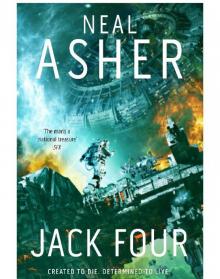 Jack Four
Jack Four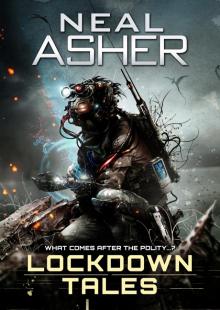 Lockdown Tales
Lockdown Tales The Warship
The Warship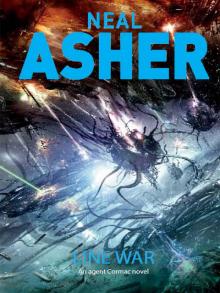 Line War
Line War Total Conflict
Total Conflict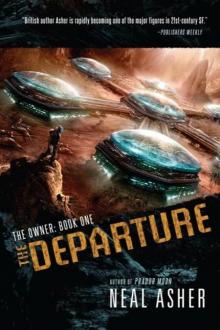 The Departure
The Departure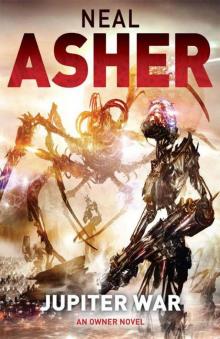 Owner 03 - Jupiter War
Owner 03 - Jupiter War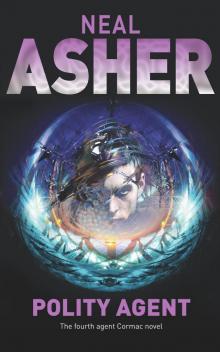 Polity Agent
Polity Agent Prador Moon
Prador Moon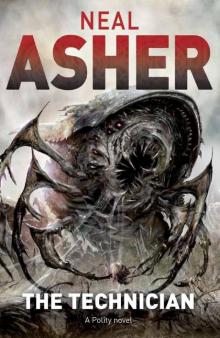 The Technician
The Technician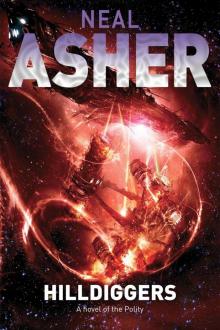 Hilldiggers
Hilldiggers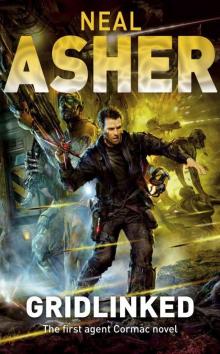 Gridlinked
Gridlinked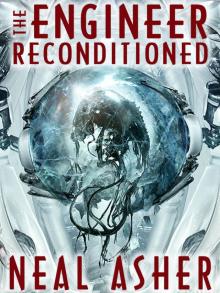 The Engineer ReConditioned
The Engineer ReConditioned Dark Intelligence
Dark Intelligence The Soldier: Rise of the Jain, Book One
The Soldier: Rise of the Jain, Book One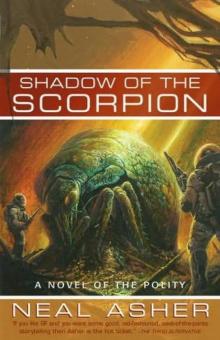 Shadow of the Scorpion p-2
Shadow of the Scorpion p-2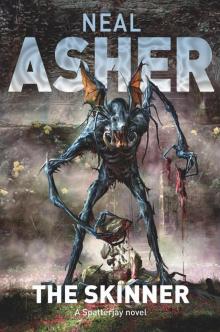 The Skinner
The Skinner The Soldier
The Soldier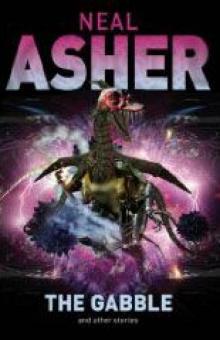 The Gabble p-13
The Gabble p-13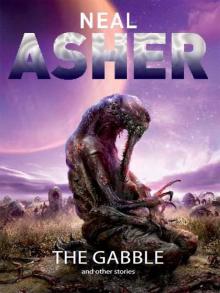 The Gabble and Other Stories
The Gabble and Other Stories The Parasite
The Parasite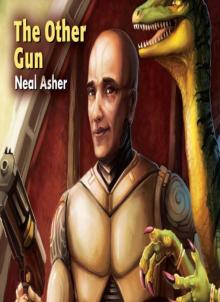 The Other Gun
The Other Gun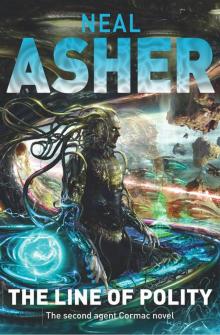 The Line of Polity
The Line of Polity Zero Point (Owner Trilogy 2)
Zero Point (Owner Trilogy 2)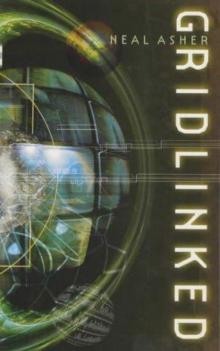 Gridlinked ac-1
Gridlinked ac-1 Prador Moon p-1
Prador Moon p-1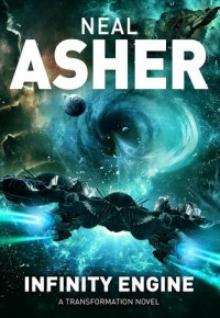 Infinity Engine
Infinity Engine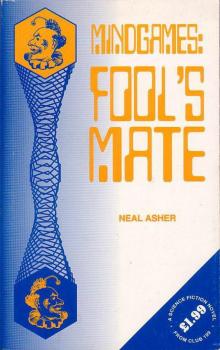 Mindgames: Fool's Mate
Mindgames: Fool's Mate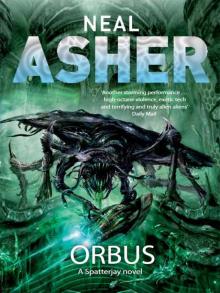 Orbus
Orbus Africa Zero
Africa Zero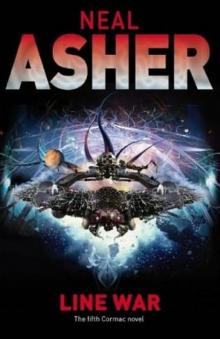 Line War ac-5
Line War ac-5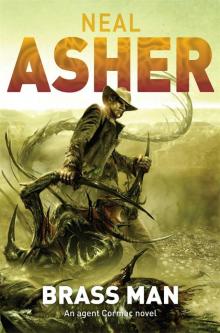 Brass Man
Brass Man The Departure to-1
The Departure to-1 Cowl
Cowl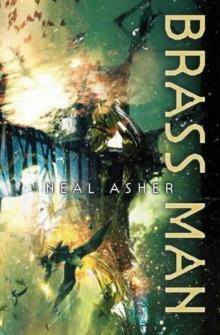 Brass Man ac-3
Brass Man ac-3 Hilldiggers (polity)
Hilldiggers (polity)![Greg Bear - [Eon Trilogy 1] - Eon (rescan) (v1.0) Read online](http://i1.bookreadfree.com/i2/04/08/greg_bear_-_eon_trilogy_1_-_eon_rescan_v1_0_preview.jpg) Greg Bear - [Eon Trilogy 1] - Eon (rescan) (v1.0)
Greg Bear - [Eon Trilogy 1] - Eon (rescan) (v1.0) The Skinner s-1
The Skinner s-1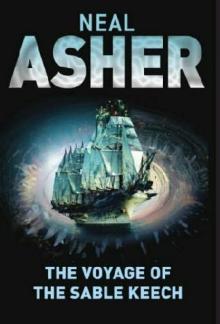 The Voyage of the Sable Keech s-2
The Voyage of the Sable Keech s-2 The Line of Polity ac-2
The Line of Polity ac-2 War Factory: Transformations Book Two
War Factory: Transformations Book Two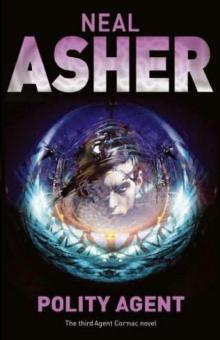 Polity Agent ac-4
Polity Agent ac-4